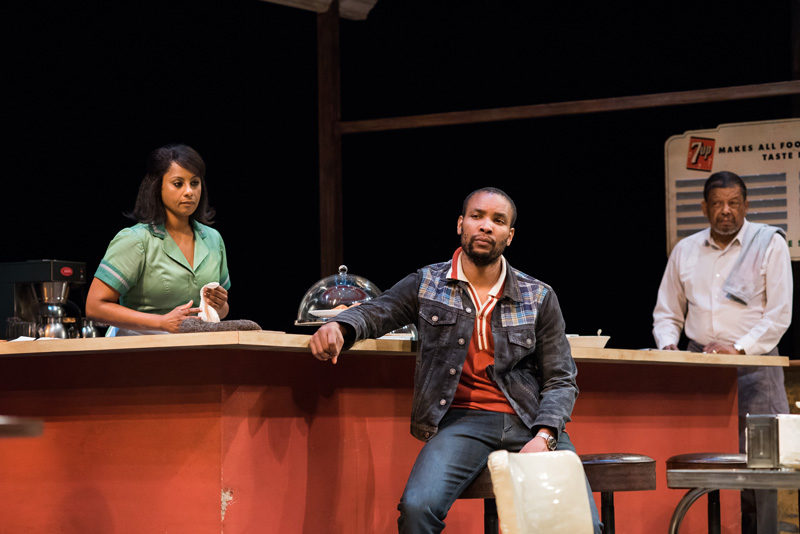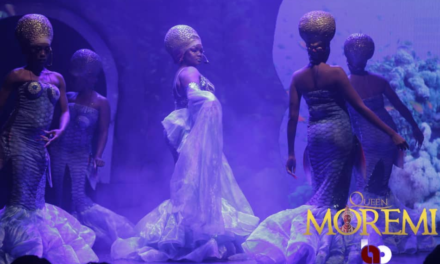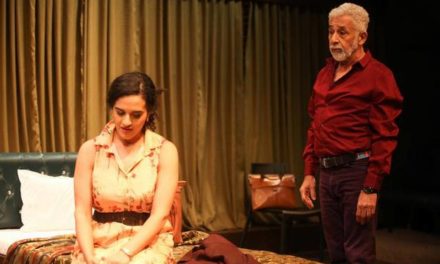A play set in an endangered Philadelphia diner in the late 60’s, Two Trains Running feels as relevant now as any contemporary play written today. The characters in the show aren’t worried about politics or the war; they’re more concerned with their survival. Will they have enough money, business, or faith to survive to the next year? They talk about discrimination, police brutality, and the government buying out their neighborhoods to make way for new developments. All of this while keeping in mind the Civil Rights Movement.
The show began slowly, with each character being established before jumping into the real problems of the world. It felt a little cliche to have each character enter one at a time and kind of introduce themselves. Once they were all together, however, they jumped right into talking about what was happening outside the doors of the small diner. Wolf (Reginald Andre Jackson) goes around playing numbers, a gambling game while the owner of the diner Memphis Lee (Eugene Lee) tends to customers who aren’t there. Holloway (David Emerson Toney) limps in, always there to give advice, even when no one asks for it, and eventually, the wealthy mortician, West, joins them for a moment to eat his pie and give Memphis a new deal to buy his building, which Memphis always refuses.
Sterling (Carlton Byrd) comes out of nowhere and I half-expected him to be gone before Act 2. Yet his persistent courting of Risa (Nicole Lewis) and his need to be heard keep him around. He is yearning for love and the ability to prove that he is a good man. He is unsure of how to become that when he is constantly seen as a failure in the eyes of both those around him and the unseen white people who constantly arrest and mock him just because of the color of his skin.
At the center of all of this is the Civil Rights Movement. At this point, Malcolm X and Martin Luther King Jr. are both mentioned to be dead. Sterling is fired up by the rallies that are still happening in Malcolm X’s honor, wanting to convince everyone in the diner to go, including Risa and Memphis who are adamant against it. Ironically, Memphis seems to have the most to say about how he has been discriminated against. He spends the play talking about what he wanted to do, what he should have done, and what happened to him in his life to prevent him from accomplishing those things. He tells the story of the small farm he had in the south, the labor and love he put into the fields that his father had left him, and how the white men in the town burned it to the ground and ran him out of town.
A Woman of Power
Risa, as the only woman in the play, is seemingly put on the outskirts of the Civil Rights movement. She is never acknowledged for her work. The character has very few lines (everyone else gets a monologue or two and she doesn’t have one), and she seems on the outskirts of what is happening politically in the city. She is stuck by old American values while being berated for her act of defiance: cutting her legs. For this, she is told she isn’t beautiful anymore. The men simultaneously ignore Risa’s opinions while also giving her their own about her personal life. They talk behind her back about why she isn’t married yet. She is constantly being pushed from every side by the men in her life.
Even during one of the transitions between scenes, there was a moment where Risa, illuminated in a bright yellow light and set to a blues song, seemed to struggle to get out of the kitchen and back into the dining room. She seemed caught between her responsibilities and what is expected of her and her true desire to have a voice in these conversations.
A Man of Few Words
Not just covering discrimination of people of color and women, the plays also introduces us to Hambone (Frank Riley III). A large man in a mentally deteriorated state, he can only say two things: “I want my ham” and “He gonna give me my ham,” referencing the grocery store owner who promised Hambone a ham nine years ago. Sterling takes a liking to Hambone and shows him some new phrases: “Black is beautiful” and “United we stand, divided we fall.” It was a beautiful moment, a brief understanding between two people that Hambone hadn’t seemed to have in years. For a moment, a new light was in his eyes, everyone was watching him. Sterling looked on like a proud father teaching his son to speak for the first time.
Conclusion
Two Trains Running is a stark reminder of how far we have come and how far we still have to go. For a play set in the late 60’s, the reality of what is happening is still prevalent to this day. It is shocking to me that what they were saying that was happening in 1969 is still relevant in 2018. In some cases, it feels like we have even gone backward. History is repeating itself. It is up to us to prevent it from going farther than it already has.
This post was written by the author in their personal capacity.The opinions expressed in this article are the author’s own and do not reflect the view of The Theatre Times, their staff or collaborators.


















